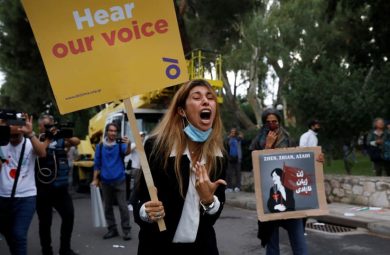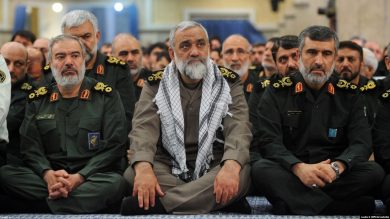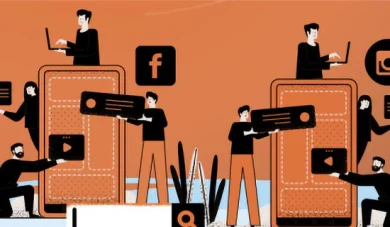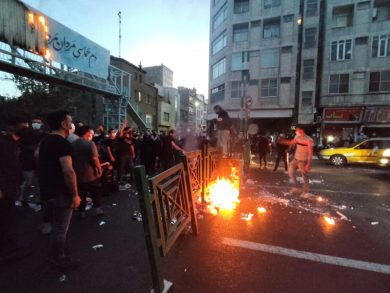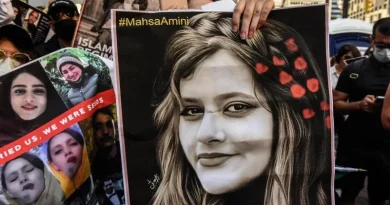For decades, the Islamic Revolutionary Guard Corps (IRGC) has operated with near-total impunity—detaining dissidents, sponsoring terrorism, torturing protesters, and funding militias across the Middle East. But the tide is turning. What once lived solely in the realm of social media hashtags and protest chants is now entering the halls of justice. From survivor testimonies to international tribunals, the fight for accountability is moving from the streets to the courtrooms.
This is the story of how digital activism, grassroots organizing, and transnational legal efforts are converging to hold the IRGC accountable—not just as a tool of domestic repression, but as a global criminal enterprise.
1. Hashtags That Shook a Regime
Activism against the IRGC gained unprecedented momentum after the death of Mahsa (Jina) Amini in September 2022. The hashtag #MahsaAmini and the rallying cry #WomanLifeFreedom went viral, used millions of times in over 100 countries. Protest videos, survivor testimony, and images of state violence spread across Instagram, Twitter, and TikTok faster than the regime could censor them.
But more than visibility, these hashtags served as documentation—real-time evidence collection that would later fuel lawsuits, sanctions, and tribunal proposals.
Digital Mobilization Included:
• Archiving videos of protests and police brutality
• Identifying IRGC officers involved in crackdowns
• Sharing testimonies from inside prisons
• Coordinating diaspora protests and lobbying campaigns
What began as hashtags became an infrastructure of evidence.
2. Naming the Perpetrators: Doxing for Justice
Iranian activists, often operating in exile or anonymously inside Iran, have used open-source intelligence (OSINT) techniques to identify and expose IRGC agents involved in abuses.
Methods Include:
• Analyzing protest footage to identify badge numbers and uniforms
• Matching photos with social media profiles
• Crowdsourcing from eyewitnesses and former detainees
• Leaking internal regime documents
Outcomes:
• Dozens of IRGC commanders and intelligence officials have been named publicly
• Some have been sanctioned by foreign governments
• Others have been targeted in legal complaints under universal jurisdiction
This public exposure is a form of digital justice that precedes formal legal action.
3. Legal Precedents: From Social Movements to International Courts
Activists have drawn lessons from other human rights struggles—Rwanda, Chile, Bosnia, and Syria—where documentation and persistence turned political crimes into legal cases.
What’s Changing:
• Human rights lawyers now see the IRGC as prosecutable under international law
• Survivors are filing testimonies with UN bodies and European courts
• Universal jurisdiction is being tested in courts from Sweden to Germany
The shift is seismic: state terror is no longer untouchable.
4. The Role of Universal Jurisdiction
Universal jurisdiction allows national courts to try individuals for crimes like torture, genocide, or war crimes—even if committed abroad and against non-citizens.
Key Cases:
• Hamid Nouri trial (Sweden): First prosecution of an Iranian official for 1988 prison massacres
• 2023 Berlin filings: Iranian-German activists filed lawsuits against IRGC officials for torture and sexual violence during 2022 protests
• 2024 UK complaint: Filed by legal NGOs against IRGC commanders over threats to exiled journalists
These cases represent a new frontier: turning viral activism into binding legal accountability.
5. Survivor Testimonies: The Heart of Every Case
Legal efforts hinge on the courage of survivors who testify—despite trauma, stigma, and fear of reprisal.
Testimonies Include:
• Detailed accounts of beatings, rape, and solitary confinement
• Identification of prison guards and torture methods
• Documentation of deaths in custody and denial of medical care
• Statements from family members of those executed or disappeared
Lawyers and NGOs now provide training, counseling, and protection for survivors willing to come forward.
Their stories, once tweets or Instagram posts, are now sworn affidavits filed in court.
6. Strategic Litigation by NGOs and Advocacy Groups
A new generation of Iranian and international NGOs is building legal cases, not just petitions.
Notable Organizations:
• Justice for Iran: Compiles evidence, supports survivors, and files international complaints
• Aban Tribunal: A people’s tribunal launched by activists to document the November 2019 massacre
• Redress and Center for Justice and Accountability: Focus on torture and transnational repression cases
These groups use:
• Archival footage
• Leaked IRGC documents
• Testimonies from inside and outside Iran
Together, they form a legal ecosystem of accountability.
7. Targeting the IRGC’s Global Footprint
The IRGC doesn’t operate only in Iran. It runs front companies, cultural centers, and embassies used for surveillance and intimidation abroad.
Legal Tactics:
• Freezing assets of IRGC front companies under anti-terror finance laws
• Filing civil suits against banks or firms that facilitate IRGC money laundering
• Targeting embassies and “cultural attachés” involved in transnational repression
Notable Examples:
• 2018 Paris bomb plot: Iranian diplomat Assadollah Assadi convicted in Belgium
• 2021–2023: IRGC assassination plots foiled in the U.S., Denmark, and Turkey
By going after the enablers, activists are disrupting the IRGC’s international reach.
8. Sanctions as Legal Tools
Activists have successfully pushed for:
• Magnitsky-style sanctions on IRGC officers for human rights abuses
• Visa bans and travel restrictions on commanders and their families
• Terrorist designations for the IRGC (U.S.) and Quds Force (EU)
The next step: pushing for full IRGC designation across the EU, UK, and Canada.
Legal activism has reframed sanctions—not just as diplomacy, but as survivor-centered justice.
9. Challenges: Legal Hurdles and Political Roadblocks
Obstacles Include:
• Lack of political will in some Western capitals
• Difficulty obtaining physical evidence inside Iran
•Retaliation threats against families of survivors
• Statute of limitations and legal immunity for some officials
But activists are building innovative workarounds:
• Using leaked documents instead of court subpoenas
• Filing civil suits where criminal charges are blocked
• Using international bodies like the ICC and UNHRC to build pressure
Persistence is paying off.
10. What’s Next: Building a Legal Movement
Priorities for 2024–2025:
• Expand survivor support and trauma-informed legal services
• Coordinate international legal campaigns across countries
• Train a new generation of lawyers focused on IRGC accountability
• Push for a UN special tribunal or fact-finding mission
Just as activism has evolved from street protests to digital campaigns, the next evolution is legal warfare.
Justice is slow. But it is gathering speed.
Conclusion: From Hashtag to History
#WomanLifeFreedom began as a protest chant. Now it is legal evidence.
Every tweet, every video, every voice raised against the IRGC was not in vain.
It was a building block for justice.
Join Our Newsletter!
Stay informed with the latest updates, news, and ways to take action in the fight for justice and global security. Sign up now to get updates delivered straight to your inbox!

